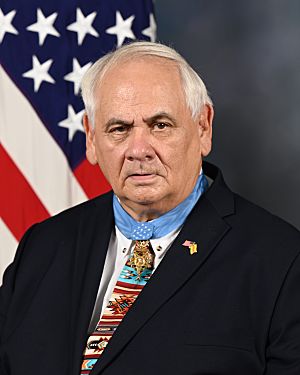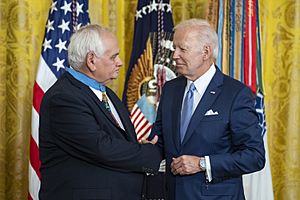Dwight W. Birdwell facts for kids
Quick facts for kids
Dwight W. Birdwell
|
|
|---|---|

Birdwell in 2022
|
|
| Born | 19 January 1948 Amarillo, Texas, U.S. |
| Allegiance | United States of America |
| Service/ |
|
| Years of service | 1966–1968 |
| Rank | Specialist 5 |
| Unit | Troop C, 3rd Squadron, 4th Cavalry Regiment |
| Battles/wars |
|
| Awards | Medal of Honor Purple Heart (2) Silver Star (2) Bronze Star |
Dwight Wayne Birdwell (born 19 January 1948) is a former United States Army soldier. He received the Medal of Honor in 2022. This award is the highest honor for bravery a soldier can receive in the United States. He earned it for his heroic actions during the Vietnam War in 1968.
Contents
Early Life and Background
Dwight W. Birdwell was born in Amarillo, Texas. His birthday is January 19, 1948. He is a citizen of the Cherokee Nation. He grew up in a small community called Bell, Oklahoma, where most people were Cherokee Indian. He went to Bell Grade School and later graduated from Stilwell High School in 1966.
Military Service
Birdwell joined the United States Army on May 24, 1966.
Serving in Vietnam
Birdwell was part of Troop C, 3rd Squadron, 4th Cavalry, which was a unit of the 25th Infantry Division.
On January 31, 1968, his unit responded to a big attack during the Tet Offensive. This attack happened at Tan Son Nhut Air Base in Vietnam. Birdwell's unit was the first American ground team from outside the base to arrive and help.
During the intense fighting, his tank commander was badly hurt. Birdwell quickly took charge of the tank. He fired at the enemy soldiers until his ammunition ran out. Then, he grabbed an M60 machine gun and kept fighting. Even after the machine gun was damaged and he was wounded, he kept going. He bravely ran through enemy fire to get more ammunition for his fellow soldiers from other damaged vehicles. For his courage that day, he received his first Silver Star award.
A few months later, on July 4, 1968, Birdwell again showed incredible bravery. He risked his life to save American soldiers who were stuck in a battle zone. He saw a damaged Army vehicle and, ignoring heavy enemy fire, loaded wounded soldiers into it. He then drove them to safety. After that, he went back into the dangerous village to rescue more Americans. For these actions, he was given his second Silver Star.
Birdwell finished his service in Vietnam and returned to the United States in December 1968.
Life After the Army
After his military service, Dwight Birdwell went to college. He attended Northeastern State University. Later, he studied law at the University of Oklahoma College of Law, graduating in 1976.
He became a lawyer in Oklahoma City. He also served on the Judicial Appeals Tribunal (which is like the Supreme Court) for the Cherokee Nation. He was a member from 1987 to 1999, and he was the chief justice for some of those years.
Family Life
Dwight Birdwell has been married for 53 years. He and his wife have two children and two grandchildren.
Receiving the Medal of Honor

On June 27, 2022, it was announced that President Joe Biden would present the Medal of Honor to Dwight Birdwell. The ceremony took place on July 5, 2022, at the White House.
The Medal of Honor was given to Specialist 5 Dwight W. Birdwell for his amazing bravery on January 31, 1968. During a large enemy attack on Tan Son Nhut Airbase, his unit faced the main force of the enemy. When his tank commander was hurt, Birdwell moved him to safety and took control of the tank. He used the tank's weapons and his own rifle to fight the enemy. Even after his communications were damaged and he ran out of ammunition, he kept fighting.
He got more machine guns and ammunition from a downed helicopter. When one of his machine guns exploded and wounded him, he refused to leave. Instead, he gathered more ammunition from damaged vehicles and gave it to other defenders. He even led a small group of soldiers and used hand grenades to stop the enemy attack until more help arrived. After reinforcements came, he helped evacuate the wounded until he was told to get medical attention for his own injuries. Throughout the entire battle, Birdwell repeatedly put himself in danger to protect his team and defeat the enemy. His actions showed incredible heroism and selflessness.
See also
 | Ernest Everett Just |
 | Mary Jackson |
 | Emmett Chappelle |
 | Marie Maynard Daly |

